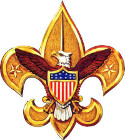
Overview Requirements Hints Terminology Resources
Art Merit Badge Info
What is Art? That is the question, at least for requirement #1 of this merit badge, it is. This entire merit badge can be done in a morning or an afternoon, except for visiting an art facility - if a virtual tour is allowed by the counselor, that could be fulfulled, too.
This is one of the easiest merit badges available with just a little terminology, drawing a handful of pictures, and that visit being all there is to it. That might be why about 21,000 scouts earn it every year, placing it at the 25th most popular spot.
Requirements for the Art merit badge:
- Discuss the following with your counselor:
- What art is and what some of the different forms of art are
- The importance of art to humankind
- What art means to you and how art can make you feel
- Discuss with your counselor the following terms and elements of art: line, value, shape, form, space, color, and texture. Show examples of each element.
- Discuss with your counselor the six principles of design: rhythm, balance, proportion, variety, emphasis, and unity.
- Render a subject of your choice in FOUR of these ways:
- Pen and ink,
- Watercolors,
- Pencil,
- Pastels,
- Oil paints,
- Tempera,
- Acrylics,
- Charcoal
- Computer drawing or painting
- Do ONE of the following:
- Design something useful. Make a sketch or model of your design. With your counselor's approval, create a promotional piece for the item using a picture or pictures.
- Tell a story with a picture or pictures or using a 3-D rendering.
- Design a logo. Share your design with your counselor and explain the significance of your logo. Then, with your parent's permission and your counselor's approval, put your logo on Scout equipment, furniture, ceramics, or fabric.
- With your parent's permission and your counselor's approval, visit a museum, art exhibit, art gallery, artists' co-op, or artist's workshop. Find out about the art displayed or created there. Discuss what you learn with your counselor.
- Find out about three career opportunities in art. Pick one and find out the education, training, and experience required for this profession. Discuss this with your counselor, and explain why this profession might interest you.
(Optional worksheets are maintained by usscouts.org and they have sole control over their updates.)
Hints for Art Merit Badge
- Use the worksheet to write down the terminology and definitions so they can be easily remembered when discussing them.
- For requirement #4, render the same subject four different ways, not four different subjects. The goal is to notice how different and similar the subject looks.
- Designing a logo for requirement #5 is probably the easiest, but get approval before putting it on equipment.
- Simplest way to prepare for the first three requirements is to read the merit badge pamphlet, but the links below are another option.
Terminology for Art Merit Badge
- Forms of art include architecture, drawing, fashion design, industrial design, painting, pottery, printmaking, sculpting, and weaving.
- Elements of Art:
- Line - a continuous mark creating a design.
- Value - lightness and darkness with color and saturation
- Shape - outline or surface of a form, either geometric or freeform.
- Form - solid 3-d shape which could be cone, cube, cylinder, prism, pyramid, or sphere.
- Space - positive space is the forms in the art while negative space is the empty area between them. These two types of space work together to create an image.
- Color - part of the visible spectrum reflected from an object.
- Texture - what a surface feels like, or the surface of an object in art appears to feel like.
- Principles of Design:
- Balance is the feeling of visual symmetry of a piece of art.
- Emphasis puts more focus on one part of an art piece to influence the viewer's experience.
- Proportion is the relative sizing of the various forms comprising a piece to appear realistic or exaggerated.
- Rhythm is the repeating of a design element to lead the observer's focus.
- Unity is the successful use of design principles to arrange all the elements into a complete work of art.
- Variety uses different elements in a piece to provide contrast and make it more interesting.
Resources for Art Merit Badge
Yes, Art is Important.
Artists communicate using the elements of art.
When creating art, incorporating the principles of design help make an impressive piece.
Take a look at some of the many mediums and techniques for creating great art.
Research what Art Careers are available in the real world.
National Portfolio Day
NASAD
Some related merit badges include: Animation, Graphic Arts, Moviemaking, Painting, Photography, Pottery, and Sculpture. If you found the Art merit badge interesting, you might try them.
Comments:
Feb 21, 2013 - stanley knox
Jun 23, 2013 - David
Jun 23, 2013 - Scouter Paul
Dec 07, 2013 - Amanda
Mar 25, 2015 - Ian Stuart
Apr 27, 2016 - Aman1
Apr 27, 2016 - Scouter Paul
Jan 30, 2023 - gavin mannon
Feb 02, 2023 - Scouter Paul
Feb 10, 2023 - Edward
Feb 10, 2023 - Scouter Paul
Nov 08, 2023 - Vanessa
Jul 11, 2024 - Rebecca
Scouting 2025 - Ask a Question - Add Content
Just for Fun: Socializing merit badge




Find more Scouting Resources at www.BoyScoutTrail.com



Follow Me, Scouts
Recent Comments